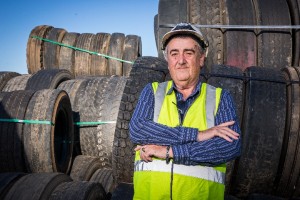
Australian tyre recycler Green Distillation Technologies, which has already developed world-first technology that can commercially and economically turn end-of-life tyres (ELTs) into high value, oil, carbon and steel, can now take the carbon raw material and turn it into hydrogen.
Their Technical Director Denis Randall said that although their tyre recycling technology is already a commercial reality the further post process development of their products has shown it has much further to go than just the destruction of tyres.
“Once you have a carbon source at negative cost, through the destruction of a difficult to dispose of waste, such as tyres, many reduction technologies become commercial including secondary water gas reactions to produce hydrogen for subsequent use in efficient hydrogen cell electricity production,” he said.
Denis, who has a PhD. plus degrees in chemistry, mathematics and metallurgy, said that initially his idea behind the development of this technology was for garbage waste disposal, because he lived in Indonesia and the Australian Embassy was just down the road from a very smelly garbage tip.
“Hence the design had to be one of relative low cost and in my mind had to be environmentally and technically suitable for a developing country like Indonesia.
“However, for personal reasons I returned to Australia where people knew of my developments and asked me if this process could be used for destruction of end-of-life tyres to which I replied ‘it could’, in fact any organic material can be deconstructed this way,” he said.
Green Distillation Technologies started in the small country town of Warren in Western New South in 2009 when Denis Randall started his first experiments to prove his theories. Two other partners, Craig Dunn and Trevor Bayley, who brought the essential skills of finance and management to the mix, backed him. This team is still the essential core of the operation.
Trevor Bayley, who today is the Chief Operating Officer and calls Denis the ‘Wizard of Warren’ said that the key to the hydrogen development was the low cost of the raw material, namely end-of-life tyres that are a world environmental problem.
“In the process we are currently commercializing, the tyres require no pre-treatment and we produce a high value oil, plus carbon and the steel tyre beading and those products provide an excellent financial return.
“It is not generally realized but the carbon in tyres is added to the rubber to make a material that is durable, heat resistant and hard wearing otherwise a car tyre would only last 5,000 kilometres.
“But the result has been that in the modern tyre we have made a product that will last for 500 years and is very hard to recycle in a way that is environmentally compatible.
“But when we look at the products we obtain from our process, we say that, to us the carbon is the ‘sleeper’ as it is the chemical building block from which hundreds of manufactured products are made, such as plastics and paints, water filtration, printer’s ink, computer printer ink cartridges, paint, electrodes, graphene, toothpaste and cosmetics including eyeliner, mascara, nail polish, eye shadow, blushes, rouge and lipstick, the list goes on.
“Already we are working with New Zealand company CarbonScape on converting the carbon we produce into high value graphite and then graphene and this research looks very promising as they have already used sawdust as their raw material and find that our carbon is extremely compatible with their process,” Trevor Bayley said.
From that original R&D operation in a shed at the local racecourse in Warren GDT has now moved to their production facility on a 21-hectare site north of the town.
They are currently working to expand the facility to full capacity where it will be able to process an impressive 19,300 tonnes of mixed ELTs per year to generate 7,160,000 litres of high-quality oil, 9,032 tonnes of carbon and 3,760 tonnes of recovered steel. GDT has expanded the technology to include oversized tyres used in mining with a single dump truck tyre yielding 1,570 litres of oil, 1.7 tonnes of carbon and 0.76 tonnes of steel.
There is no shortage of raw material as there are 1.5 billion tyres discarded globally each year with Australia generating around 25 million ELTs a year while the USA currently discards more than 250 million.
Today, Green Distillation Technologies is at an exciting stage in its evolution as they work hard to bring their first two Australian processing facilities in Warren in Western New South Wales and Toowoomba in Southern Queensland into full production and they have plans for five other Australian plants in Gladstone, Wagga, Geelong, Elizabeth and Collie Western Australia.
In addition, they are in negotiations to finalise agreements for plants in the US, UK, South Africa and Europe and are fielding enquiries from virtually every country in the world. It is significant that virtually all these enquiries have come from within the tyre industry, particularly tyre collectors, who are aware of the growing problem and the business opportunities, as well as the shortcomings of existing recycling technology.
In the light of the burgeoning environmental disposal problem of end-of-life tyres, the GDT approach provides an economic recycling solution by turning them into valuable and highly saleable materials.
Source
Green Distillation Technologies, press release, 2020-09-09.
Supplier
CarbonScape
Green Distillation Technologies Corp.
Share
Renewable Carbon News – Daily Newsletter
Subscribe to our daily email newsletter – the world's leading newsletter on renewable materials and chemicals










